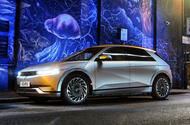Hyundai Commits to Broad Roll-Out of Extended-Range Electric Vehicles (EREVs)

Hyundai Motor has announced its commitment to a widespread introduction of extended-range electric vehicles (EREVs) as a solution to the slow demand for electric cars. This move makes Hyundai the first global car manufacturer to embrace EREVs.
What are EREVs?
EREVs, also known as range-extender cars (REx), are vehicles that combine a large battery and electric motor with a small petrol engine acting as a generator.
Hyundai’s Plans
Hyundai will produce mid-size SUVs with EREV technology in the US, starting in 2026, for both Hyundai and its premium Genesis brands. In China, compact models using a dedicated EREV platform will be manufactured. The company also hinted at plans to expand into advanced markets, suggesting European sales are on the horizon.
The decision to shift towards EREVs is a response to the recent slowdown in EV demand, according to Jaehoon Chang, president and CEO of Hyundai Motor. Chang sees this as an opportunity for Hyundai to buy more time and better prepare for the future of EVs.
EREVs in the Global Market
EREVs have gained popularity in China, with local manufacturers such as Li Motor, Leapmotor, Neta, and Avatr introducing models that combine large batteries with smaller combustion-engine generators. However, global brands have been less enthusiastic about the technology, focusing more on EVs, plug-in hybrids, and hybrids.
Currently, the only EREV model available in the UK is the Mazda MX-30 R-EV small SUV. Previous models include the REx version of the discontinued BMW i3. While Stellantis plans to sell an EREV version of its new Ram electric pick-up, Ineos has canceled its planned Fusilier electric and EREV models.
BMW and Mercedes-Benz have also expressed their reluctance to invest in EREV technology due to concerns about the additional cost and the challenge of ensuring a smooth transition between electric and combustion power in premium vehicles.
Hyundai’s EREV Technology
Hyundai has been developing its EREV drivetrain for the past two years, aiming to create a system that surpasses rival offerings. The company promises a seamless driving experience as the drivetrain switches between the battery and motor generator to power the electric motor.
By using a battery that is approximately 30% the size of an EV battery, Hyundai can reduce costs. The system also eliminates the need for a transmission, further reducing expenses and making it competitive against plug-in hybrids. Hyundai believes that the key to success lies in the controller.
Hyundai’s Hybrid Line-Up
In addition to EREVs, Hyundai plans to expand its full-hybrid (HEV) line-up from seven to 14 models, including Genesis, by 2030. This expansion aims to bridge the gap in demand until the anticipated recovery in EV sales. Hyundai expects to sell two million EVs globally by 2030, with a range of 21 models, including the upcoming Ioniq 9 three-row SUV.
As Hyundai Motor owns Genesis and holds a third of Kia, it is likely that Kia will also introduce EREV models in the future.

